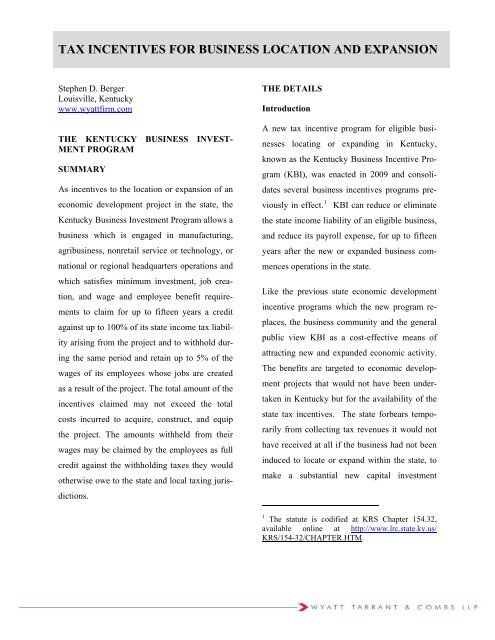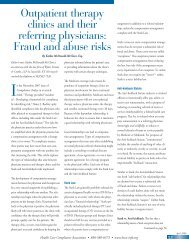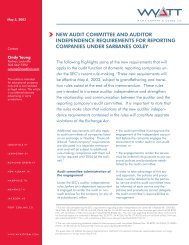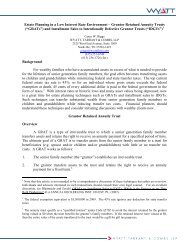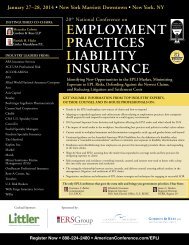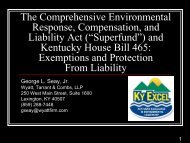Tax Incentives for Business Location and Expansion
Tax Incentives for Business Location and Expansion
Tax Incentives for Business Location and Expansion
Create successful ePaper yourself
Turn your PDF publications into a flip-book with our unique Google optimized e-Paper software.
TAX INCENTIVES FOR BUSINESS LOCATION AND EXPANSION<br />
Stephen D. Berger<br />
Louisville, Kentucky<br />
www.wyattfirm.com<br />
THE KENTUCKY BUSINESS INVEST-<br />
MENT PROGRAM<br />
SUMMARY<br />
As incentives to the location or expansion of an<br />
economic development project in the state, the<br />
Kentucky <strong>Business</strong> Investment Program allows a<br />
business which is engaged in manufacturing,<br />
agribusiness, nonretail service or technology, or<br />
national or regional headquarters operations <strong>and</strong><br />
which satisfies minimum investment, job creation,<br />
<strong>and</strong> wage <strong>and</strong> employee benefit requirements<br />
to claim <strong>for</strong> up to fifteen years a credit<br />
against up to 100% of its state income tax liability<br />
arising from the project <strong>and</strong> to withhold during<br />
the same period <strong>and</strong> retain up to 5% of the<br />
wages of its employees whose jobs are created<br />
as a result of the project. The total amount of the<br />
incentives claimed may not exceed the total<br />
costs incurred to acquire, construct, <strong>and</strong> equip<br />
the project. The amounts withheld from their<br />
wages may be claimed by the employees as full<br />
credit against the withholding taxes they would<br />
otherwise owe to the state <strong>and</strong> local taxing jurisdictions.<br />
THE DETAILS<br />
Introduction<br />
A new tax incentive program <strong>for</strong> eligible businesses<br />
locating or exp<strong>and</strong>ing in Kentucky,<br />
known as the Kentucky <strong>Business</strong> Incentive Program<br />
(KBI), was enacted in 2009 <strong>and</strong> consolidates<br />
several business incentives programs previously<br />
in effect. 1 KBI can reduce or eliminate<br />
the state income liability of an eligible business,<br />
<strong>and</strong> reduce its payroll expense, <strong>for</strong> up to fifteen<br />
years after the new or exp<strong>and</strong>ed business commences<br />
operations in the state.<br />
Like the previous state economic development<br />
incentive programs which the new program replaces,<br />
the business community <strong>and</strong> the general<br />
public view KBI as a cost-effective means of<br />
attracting new <strong>and</strong> exp<strong>and</strong>ed economic activity.<br />
The benefits are targeted to economic development<br />
projects that would not have been undertaken<br />
in Kentucky but <strong>for</strong> the availability of the<br />
state tax incentives. The state <strong>for</strong>bears temporarily<br />
from collecting tax revenues it would not<br />
have received at all if the business had not been<br />
induced to locate or exp<strong>and</strong> within the state, to<br />
make a substantial new capital investment<br />
1 The statute is codified at KRS Chapter 154.32,<br />
available online at http://www.lrc.state.ky.us/<br />
KRS/154-32/CHAPTER.HTM.
within the state, <strong>and</strong> to create a significant number<br />
of well-paying jobs <strong>for</strong> Kentucky residents.<br />
As was the case with the previous state economic<br />
development incentive programs, KBI is<br />
administered by the Kentucky Economic Development<br />
Finance Authority (KEDFA), an agency<br />
within the Kentucky Cabinet <strong>for</strong> Economic Development<br />
(KEDC) composed of six private<br />
citizens with experience in business or finance<br />
appointed by the Governor <strong>and</strong>, ex officio, the<br />
Secretary of the Kentucky Finance <strong>and</strong> Administration<br />
Cabinet.<br />
Eligible Companies <strong>and</strong> Eligible <strong>Business</strong> Activities<br />
A company eligible <strong>for</strong> incentives under KBI<br />
(an eligible company) includes any corporation,<br />
limited liability company, partnership, limited<br />
partnership, sole proprietorship, business trust,<br />
or any other entity with a proposed economic<br />
development project (as defined below) that is<br />
engaged in or is planning to be engaged in one<br />
or more of the following activities within the<br />
Commonwealth of Kentucky (an eligible business<br />
activity):<br />
Manufacturing;<br />
Agribusiness;<br />
Nonretail service or technology; or<br />
National or regional headquarters operations,<br />
regardless of the underlying business<br />
activity of the company.<br />
“Manufacturing” means any activity involving<br />
or relating to the processing, assembling, or production<br />
of any property <strong>and</strong> includes storage,<br />
warehousing, distribution, <strong>and</strong> office activities<br />
related to the manufacturing activity.<br />
“Agribusiness” means the processing of raw agricultural<br />
products, including timber, or the per<strong>for</strong>mance<br />
of value-added functions with regard<br />
to raw agricultural products.<br />
A “nonretail service or technology” activity<br />
must be (a) designed to serve a multistate, national,<br />
or international market <strong>and</strong> more than<br />
50% of the services must be provided to customers<br />
outside of Kentucky or (b) provided by a<br />
national or regional headquarters as a support to<br />
other business activities conducted by the eligible<br />
company. Nonretail service or technology<br />
includes but is not limited to call centers, centralized<br />
administrative or processing centers,<br />
telephone or Internet sales order or processing<br />
centers, distribution or fulfillment centers, data<br />
processing centers, research <strong>and</strong> development<br />
facilities, <strong>and</strong> other similar activities.<br />
A company is not eligible <strong>for</strong> incentives under<br />
KBI if its primary activity to be conducted<br />
within Kentucky is <strong>for</strong>estry, fishing, mining,<br />
coal or mineral processing, the provision of utili-<br />
2
ties, construction, wholesale trade, retail trade,<br />
real estate, rental <strong>and</strong> leasing, educational services,<br />
accommodation <strong>and</strong> food services, or public<br />
administration services.<br />
Eligible Economic Development Projects<br />
An economic development project eligible <strong>for</strong><br />
incentives under KBI means the acquisition,<br />
leasing, or construction <strong>and</strong> equipping of a new<br />
facility to be used by an eligible company <strong>for</strong> an<br />
eligible business activity or the acquisition, leasing,<br />
rehabilitation, or expansion <strong>and</strong> equipping<br />
of an existing facility to be used by an eligible<br />
company <strong>for</strong> an eligible business activity. Subject<br />
to the following exceptions, an eligible economic<br />
development project does not include any<br />
project that will result in the replacement of existing<br />
facilities in the Commonwealth.<br />
KEDFA may approve as an eligible economic<br />
development project a project which rehabilitates<br />
an existing facility used <strong>for</strong> an eligible<br />
business activity if the facility has not been in<br />
operation <strong>for</strong> a period of 90 or more consecutive<br />
days or the current occupant of the facility has<br />
advertised a notice of closure <strong>and</strong> the eligible<br />
company proposing the economic development<br />
project is not an affiliate of the current occupant<br />
of the facility.<br />
KEDFA may approve as an eligible economic<br />
development project a project which replaces an<br />
existing facility used <strong>for</strong> an eligible business<br />
activity if:<br />
the facility is sold or transferred pursuant<br />
to a <strong>for</strong>eclosure ordered by a court of<br />
competent jurisdiction or an order of a<br />
bankruptcy court of competent jurisdiction<br />
<strong>and</strong> title to the facility prior to the<br />
sale is not vested in the eligible company<br />
or an affiliate of the eligible company;<br />
the facility has been or is being condemned<br />
by governmental authority <strong>and</strong><br />
normal operations at the facility cannot be<br />
resumed within 12 months;<br />
the facility has been damaged or destroyed<br />
by fire or other casualty to the extent<br />
that normal operations cannot be resumed<br />
at the facility within 12 months; or<br />
the facility replaces an existing facility located<br />
in the same county if the existing<br />
facility cannot be exp<strong>and</strong>ed due to the unavailability<br />
of real estate at or adjacent to<br />
the facility to be replaced, but in such a<br />
case incentives under KBI are available<br />
only to the extent of the expansion <strong>and</strong> incentives<br />
are not allowed <strong>for</strong> the equivalent<br />
of the facility being replaced.<br />
KEDFA may not approve an economic development<br />
project <strong>for</strong> incentives under KBI which<br />
3
esults in the ab<strong>and</strong>onment or termination of an<br />
existing lease without the consent of the lessor.<br />
Enhanced Incentive Counties<br />
As described below, the minimum wage requirements<br />
<strong>and</strong> the extent of the available incentives<br />
under the Kentucky <strong>Business</strong> Incentive<br />
Program vary according to whether an eligible<br />
economic development project is located in an<br />
enhanced incentive county 2 . A county is an enhanced<br />
incentive county if (a) its average annual<br />
unemployment rate in the five preceding calendar<br />
years exceeded the average annual unemployment<br />
rate of the state during those years; (b)<br />
its unemployment rate <strong>for</strong> the preceding calendar<br />
year was more than 200% of the statewide<br />
unemployment rate <strong>for</strong> such year; or (c) KEDFA<br />
certifies that the county is one of the 60 most<br />
distressed counties in the state (out of the state’s<br />
total of 120 counties) based on its average rate<br />
of unemployment during the three most recent<br />
consecutive calendar years, the percentage of the<br />
residents of the county 25 years of age <strong>and</strong> older<br />
who have not attained a high school education or<br />
the equivalent, <strong>and</strong> the quality of the roads in the<br />
county.<br />
2 A map of Kentucky showing which counties are<br />
currently enhanced incentive counties is available on<br />
the KEDC website at<br />
http://www.thinkkentucky.com/kyedc/pdfs/KREDA_<br />
Counties.pdf.<br />
Once a project located in an enhanced incentives<br />
county receives final approval <strong>for</strong> KBI incentives<br />
as described below, it continues to be eligible<br />
<strong>for</strong> enhanced incentives even if the county<br />
subsequently ceases to be an enhanced incentives<br />
county. A project which has received preliminary<br />
approval <strong>for</strong> KBI incentives as described<br />
below will remain eligible <strong>for</strong> enhanced<br />
incentives if it receives final approval by July 1<br />
of the third year following the county’s decertification<br />
as an enhanced incentives county.<br />
Minimum Requirements <strong>for</strong> Eligible Economic<br />
Development Projects<br />
To be eligible <strong>for</strong> KBI incentives, an economic<br />
development project must satisfy the following<br />
minimum requirements:<br />
Minimum Investment<br />
The eligible company must incur eligible costs<br />
(as defined below) <strong>for</strong> its economic development<br />
project of at least $100,000.<br />
Minimum New Employment<br />
The economic development project must create<br />
a minimum of 10 new, full-time (at least 35<br />
hours per week) jobs <strong>for</strong> Kentucky residents <strong>and</strong><br />
must maintain an annual average of 10 new, fulltime<br />
jobs <strong>for</strong> Kentucky residents.<br />
Minimum Wages <strong>and</strong> Benefits<br />
For projects in enhanced incentive counties, at<br />
least 90% of the new employees must receive<br />
4
ase hourly wages of at least 125% of the federal<br />
minimum wage 3 . For projects in other counties,<br />
at least 90% of the new employees must<br />
receive base hourly wages of at least 150% of<br />
the federal minimum wage.<br />
All the new employees must be entitled to employee<br />
benefits equal to at least 15% of the<br />
minimum wage target (as defined below) or,<br />
alternatively, total hourly compensation (wages<br />
<strong>and</strong> benefits) equal to at least 115% of the<br />
minimum wage target. For purposes of KBI,<br />
employee benefits means nonm<strong>and</strong>ated payments<br />
<strong>for</strong> health insurance, life insurance, dental<br />
insurance, vision insurance, <strong>and</strong> defined benefit<br />
plans, profit sharing plans, 401(k) plans, or similar<br />
plans, but do not include bonuses, commissions,<br />
incentive pay, or any other contingent<br />
compensation.<br />
“But For” Requirement<br />
For new projects locating in Kentucky, the company<br />
must certify that its economic development<br />
project could reasonably <strong>and</strong> efficiently locate<br />
outside of Kentucky <strong>and</strong> without the incentives<br />
offered under KBI the project will likely locate<br />
outside of Kentucky.<br />
For economic development project involving the<br />
expansion of an existing facility in Kentucky,<br />
3 The federal minimum wage is currently $7.25 per<br />
hour.<br />
the company must certify that the incentives are<br />
necessary <strong>for</strong> the project to occur.<br />
Eligible Costs<br />
Costs incurred by an eligible company <strong>for</strong> an<br />
eligible economic development project are eligible<br />
costs <strong>and</strong> may be recovered through the<br />
company’s receipt of KBI incentives only after<br />
KEDFA adopts a resolution granting preliminary<br />
approval of the company <strong>and</strong> the project.<br />
For owned projects (as defined below), eligible<br />
costs include (a) start-up costs (as defined below)<br />
<strong>and</strong> (b) costs of acquiring l<strong>and</strong> or rights in<br />
l<strong>and</strong> <strong>and</strong> related costs, including recording fees;<br />
cost of payment <strong>and</strong> per<strong>for</strong>mance bonds,<br />
builder’s risk insurance, <strong>and</strong> other insurance required<br />
during the construction of the project;<br />
costs of labor <strong>and</strong> amounts paid to contractors,<br />
subcontractors, builders, <strong>and</strong> materialmen in<br />
connection with the project; costs of construction,<br />
including site tests <strong>and</strong> inspections; subsurface<br />
site work; excavation; removal of structures,<br />
roadways, cemeteries, <strong>and</strong> other surface<br />
obstructions; filling, grading, <strong>and</strong> providing<br />
drainage <strong>and</strong> storm water retention facilities;<br />
installation of utilities such as water, sewer,<br />
sewage treatment, gas, electric, communications,<br />
<strong>and</strong> similar facilities; off-site construction of<br />
utility extensions to the boundaries of the project<br />
site; construction <strong>and</strong> installation of railroad<br />
spurs needed to connect the project to existing<br />
railways; <strong>and</strong> similar costs which KEDFA de-<br />
5
termines are necessary <strong>for</strong> construction of the<br />
project.<br />
For leased projects (as defined below), eligible<br />
costs include start-up costs <strong>and</strong> 50% of the estimated<br />
annual rent.<br />
“Start-up costs” mean costs incurred to furnish<br />
<strong>and</strong> equip a facility <strong>for</strong> an economic development<br />
project, including costs incurred <strong>for</strong> computers,<br />
furnishings, office equipment, manufacturing<br />
equipment, <strong>and</strong> fixtures; the relocation of<br />
out-of-state equipment to the project site; <strong>and</strong><br />
nonrecurring costs of fixed telecommunications<br />
equipment.<br />
For all projects that are not located in enhanced<br />
incentive counties, the cost of equipment eligible<br />
<strong>for</strong> incentives as an eligible cost is limited to<br />
$20,000 <strong>for</strong> each new full-time job created as of<br />
the activation date of the project (as defined below).<br />
Economic development projects are classified<br />
<strong>for</strong> purposes of KBI as an owned project or a<br />
leased project. An owned project means an economic<br />
development project owned in fee simple<br />
by the eligible company or an affiliate, or possessed<br />
by the eligible company or an affiliate<br />
pursuant to a capital lease. A capital lease means<br />
a lease classified as a capital lease by Statement<br />
of Financial Accounting St<strong>and</strong>ards No. 13, Accounting<br />
<strong>for</strong> Leases, issued by the Financial Accounting<br />
St<strong>and</strong>ards Board, November 1976, as<br />
6<br />
amended (“SFAS 13”). A leased project means<br />
an economic development project occupied by<br />
the company pursuant to a lease classified under<br />
SFAS 13 as an operating lease.<br />
<strong>Incentives</strong><br />
Income <strong>Tax</strong> Credits<br />
A company approved by KEDFA <strong>for</strong> the receipt<br />
of KBI incentives (an approved company) receives<br />
each year a 100% credit against the Kentucky<br />
income tax that would otherwise be payable<br />
on the taxable income generated by its economic<br />
development project. A company receiving<br />
KBI tax credits is exempt from the payment<br />
of quarterly estimated state income tax.<br />
In the case of an approved company that pays<br />
Kentucky state corporation income tax (a C corporation<br />
<strong>for</strong> federal income tax purposes) or<br />
Kentucky limited liability entity tax (an S corporation<br />
<strong>for</strong> federal income tax purposes, or a limited<br />
liability partnership, or limited liability<br />
company, that is not publicly traded), the credit<br />
is claimed against the company’s state corporation<br />
income tax liability or state limited liability<br />
entity tax liability. In the case of a company that<br />
does not pay Kentucky state corporation income<br />
tax or limited liability entity tax (a sole proprietorship,<br />
a general partnership, a publicly traded<br />
limited partnership, or a publicly traded limited<br />
liability company), the credit is claimed against<br />
the Kentucky personal income tax liability of the<br />
sole proprietor, the partners of the general part-
nership, the partners of the publicly traded limited<br />
partnership, or the members of the publicly<br />
traded limited liability company.<br />
Wage Assessments<br />
In addition to state income tax credits, an approved<br />
company may withhold <strong>and</strong> retain up to<br />
5% of the gross wages of each employee whose<br />
job was created as a result of an economic development<br />
project in an enhanced incentive<br />
county or up to 4% (including up to 1% of any<br />
local occupational license tax) as a result of an<br />
economic development project in all other counties.<br />
The amounts withheld are known as wage<br />
assessments.<br />
Employees of a project in an enhanced incentive<br />
county may claim the 5% withheld from their<br />
wages as a credit against their Kentucky personal<br />
income tax liability. Employees of a project<br />
in other counties may claim the 3% portion<br />
of the amount withheld from their wages as a<br />
credit against their Kentucky personal income<br />
tax liability <strong>and</strong> the remaining up to 1% portion<br />
of the amount withheld from their wages as a<br />
credit against their local occupational license tax<br />
liability.<br />
As a condition to the approval of incentives under<br />
the Kentucky <strong>Business</strong> Investment Program<br />
<strong>for</strong> an economic development project located in<br />
a county other than an enhanced incentive<br />
county, the city or county where the project is<br />
7<br />
located must agree to allow a credit against the<br />
occupational license taxes the county or city<br />
would otherwise collect from the wages of the<br />
employees whose jobs are created by the project.<br />
If the county <strong>and</strong> city both impose an occupational<br />
license tax, the amount withheld <strong>and</strong> the<br />
credit allowed is prorated between them. If neither<br />
the county nor the city where the project is<br />
located imposes a local occupational license tax,<br />
the local jurisdictions must provide some alternative<br />
inducement satisfactory to KEDFA (e.g.,<br />
a contribution of l<strong>and</strong> <strong>for</strong> the project) in order<br />
<strong>for</strong> the project to be approved <strong>for</strong> incentives under<br />
KBI, unless KEDFA determines that the local<br />
jurisdictions are unable to provide a reasonable<br />
inducement.<br />
Duration of the <strong>Incentives</strong><br />
The approved company may claim income tax<br />
credits <strong>and</strong> withhold wage assessments <strong>for</strong> up to<br />
fifteen years, <strong>for</strong> projects in an enhanced incentive<br />
county, or up to 10 years, <strong>for</strong> projects in all<br />
other counties, until the sum of the income tax<br />
credits received <strong>and</strong> the wage assessment withheld<br />
equal the total confirmed approved costs (as<br />
defined below) of the company’s economic development<br />
project.<br />
Application <strong>and</strong> Approval Process<br />
A company seeking state incentives <strong>for</strong> the location<br />
or expansion of a business in Kentucky<br />
should contact the Kentucky Cabinet <strong>for</strong> Economic<br />
Development (KEDC). A KEDC staff
member will be assigned as project manager to<br />
determine the incentives <strong>for</strong> which the project<br />
may qualify <strong>and</strong> to assist the company with its<br />
application. The company must complete <strong>and</strong><br />
file with KEDFA an application <strong>for</strong>m, together<br />
with a brief history of the business <strong>and</strong> description<br />
of the proposed economic development project,<br />
a letter endorsing the project from the<br />
county judge or mayor of the county or city<br />
where the project will be located, a financial<br />
statement <strong>for</strong> the company’s most recent fiscal<br />
year, <strong>and</strong> a nonrefundable application fee of<br />
$1,000. The completed application must be received<br />
by the last Friday of the month in order to<br />
be considered <strong>for</strong> preliminary approval at the<br />
following month’s KEDFA meeting.<br />
Because of the “but <strong>for</strong>” requirement described<br />
above, any public announcement or legal commitment<br />
towards the project (such as entering<br />
into a lease, l<strong>and</strong> or equipment purchase contract,<br />
or construction contract), if not expressly<br />
conditioned upon KEDFA’s approval of the<br />
incentives, may jeopardize the eligibility of the<br />
project <strong>for</strong> incentives under the Kentucky <strong>Business</strong><br />
Incentive Program.<br />
Prior to KEDFA’s consideration of the application,<br />
the company <strong>and</strong> KEDC staff negotiate the<br />
annual average number of new full-time jobs (at<br />
least 10) that the company will commit to create<br />
<strong>and</strong> maintain at its economic development project<br />
(the jobs target) <strong>and</strong> the average minimum<br />
wage amount, including employee benefits, that<br />
the company will commit to meet <strong>for</strong> all the new<br />
full-time jobs created <strong>and</strong> maintained as a result<br />
of the economic development project (the minimum<br />
wage target), which may not be less than<br />
125% of the federal minimum wage in enhanced<br />
incentive counties or less than 150% of the federal<br />
minimum wage in all other counties, <strong>and</strong> the<br />
total maximum amount <strong>and</strong> annual maximum<br />
amount of eligible costs approved <strong>for</strong> recovery<br />
by the company through its receipt of KBI incentives<br />
(the approved costs).<br />
The criteria applied by KEDFA <strong>for</strong> reviewing<br />
<strong>and</strong> approving the application include the creditworthiness<br />
of the company, the amount of the<br />
proposed capital investment, the number of new<br />
full-time jobs to be created by the project <strong>for</strong><br />
Kentucky residents <strong>and</strong> the wages to be paid, the<br />
local community’s support of the project, <strong>and</strong><br />
the likelihood of the economic success of the<br />
project.<br />
If KEDFA adopts a resolution granting preliminary<br />
approval, the company <strong>and</strong> KEDFA execute<br />
a memor<strong>and</strong>um of agreement setting <strong>for</strong>th<br />
the preliminary jobs target, minimum wage target,<br />
<strong>and</strong> approved costs <strong>for</strong> the company’s project<br />
<strong>and</strong> the company may begin to incur expenditures<br />
<strong>and</strong> hire new employees <strong>for</strong> the project.<br />
The company has one year from the date of the<br />
preliminary approval to negotiate a tax incentive<br />
agreement with KEDC setting <strong>for</strong>th the final<br />
8
jobs target, minimum wage target, <strong>and</strong> approved<br />
costs <strong>for</strong> the project <strong>and</strong> the date (the “activation<br />
date”), which may be no later than two years<br />
after KEDFA’s final approval of the project, by<br />
which the company expects to be able to certify<br />
<strong>and</strong> document to KEDFA that it has incurred the<br />
approved costs <strong>and</strong> reached its jobs target <strong>and</strong><br />
minimum wage target. KEDFA may then adopt<br />
a resolution granting final approval of the project<br />
<strong>and</strong> authorizing its execution of the tax incentive<br />
agreement with the company. An administrative<br />
fee equal to one-quarter of one percent<br />
(.025%) of the approved costs, up to a maximum<br />
of $50,000, is payable by the company to<br />
KEDFA upon execution of the tax incentive<br />
agreement.<br />
Following the execution of the tax incentive<br />
agreement, the company must certify <strong>and</strong> document<br />
to KEDFA the approved costs it has incurred<br />
prior to the activation date (the “confirmed<br />
approved costs”), which may be less than<br />
but not more than the approved costs set <strong>for</strong>th in<br />
the tax incentive agreement, <strong>and</strong> the extent to<br />
which it has reached its job target <strong>and</strong> minimum<br />
wage target by the activation date. Subject to<br />
possible reduction, suspension, or termination of<br />
the incentives as described below if it has not<br />
reached those targets by the activation date, beginning<br />
on the activation date the company may<br />
withhold the wage assessments from the wages<br />
of its new employees at the project <strong>and</strong> may<br />
9<br />
claim KBI income tax credits against the income<br />
generated by the project.<br />
Each year during the term of the tax incentive<br />
agreement (15 years <strong>for</strong> projects in enhanced<br />
incentive counties <strong>and</strong> 10 years <strong>for</strong> projects in<br />
other counties), the company must certify <strong>and</strong><br />
document to KEDFA the extent to which it has<br />
reached or maintained its jobs target <strong>and</strong> minimum<br />
wage target <strong>and</strong>, in the case of leased projects,<br />
the amount of rent paid <strong>for</strong> the lease of the<br />
project.<br />
The amount of incentives claimed (the sum of<br />
the wage assessments <strong>and</strong> income tax credits)<br />
may not in any year exceed the annual maximum<br />
amount of incentives authorized under the<br />
tax incentive agreement nor exceed the total<br />
maximum amount of incentives authorized under<br />
the tax incentive agreement (or, if less the<br />
confirmed costs of the project).<br />
Termination, Suspension, or Reduction of<br />
<strong>Incentives</strong><br />
If the company fails to satisfy as of the activation<br />
date the minimum investment requirement,<br />
the minimum new jobs requirement, or the<br />
minimum wage requirement, the tax incentive<br />
agreement terminates <strong>and</strong> the company ceases to<br />
be eligible <strong>for</strong> KBI incentives. If the minimum<br />
requirements were satisfied as of the activation<br />
date but are not satisfied upon any subsequent<br />
annual review by KEDFA of the company’s per<strong>for</strong>mance<br />
under the tax incentive agreement,
KEDFA may suspend the company’s receipt of<br />
incentives until the minimum requirements are<br />
again satisfied or may terminate the tax incentive<br />
agreement <strong>and</strong> the company’s right to any<br />
further KBI incentives.<br />
A company will be entitled to receive 100% of<br />
the annual maximum amount of the incentives<br />
authorized under its tax incentive agreement <strong>for</strong><br />
the following year if it achieves 90% or more of<br />
its jobs target <strong>and</strong> its minimum wage target upon<br />
KEDFA’s annual review of its per<strong>for</strong>mance. If<br />
the company fails to achieve at least 90% of its<br />
jobs target or minimum wage target, the company’s<br />
annual maximum amount of incentives<br />
<strong>for</strong> the following year is reduced by the same<br />
percentage as the percentage shortfall in the jobs<br />
target or the minimum wage target. If both targets<br />
are missed, the annual maximum amount of<br />
incentives <strong>for</strong> the following year is reduced by<br />
the same percentage as the percentage shortfall<br />
in either the jobs target or the minimum wage<br />
target, whichever was greater.<br />
PROPERTY TAX ABATEMENT VIA AN<br />
INDUSTRIAL REVENUE BOND ISSUE 4<br />
Regardless of whether the interest on an industrial<br />
revenue bond (“IRB”) issue will qualify <strong>for</strong><br />
exemption from federal income tax, the issuance<br />
of an IRB to finance the establishment or expansion<br />
of a manufacturing, processing, warehouse,<br />
distribution, or other industrial facility in Kentucky<br />
can be used to obtain abatement of property<br />
taxes on the facility financed by the bond<br />
issue <strong>for</strong> the duration of the bond issue. Kentucky<br />
law allows a city or county, or KEDFA, to<br />
issue industrial revenue bonds to finance the<br />
acquisition, construction, <strong>and</strong> equipping of an<br />
industrial facility <strong>and</strong> to lease the l<strong>and</strong>, building,<br />
<strong>and</strong> equipment comprising the industrial facility<br />
(the project) to a private company <strong>for</strong> use in its<br />
business operations.<br />
The city, county, or KEDFA, issuing the bonds<br />
(the issuer) leases the project to the company <strong>for</strong><br />
a term equal to the term of the bonds (which<br />
may be up to 30 years) in return <strong>for</strong> rental pay-<br />
4 The Kentucky Industrial Revenue Bond Act, KRS<br />
Chapter 103, is online at www.lrc.state.ky.us/KRS/103-<br />
00/CHAPTER.HTM. Fact sheets <strong>for</strong> the Kentucky IRB<br />
program, including the procedure <strong>for</strong> approval of<br />
property tax abatement through an IRB <strong>and</strong> whom to<br />
contact <strong>for</strong> further in<strong>for</strong>mation, is available at the<br />
KEDC website:<br />
www.thinkkentucky.com/kyedc/pdfs/IRB_2005.pdf<br />
<strong>and</strong><br />
www.thinkkentucky.com/kyedc/pdfs/irbprocedures.pdf<br />
10
ments by the company equal to (<strong>and</strong> applied to)<br />
the principal <strong>and</strong> interest payable on the bonds.<br />
The lease provides that upon the full payment<br />
<strong>and</strong> retirement of the bonds by the company at<br />
maturity or earlier redemption, the issuer is required<br />
to convey the project to the company <strong>for</strong><br />
no additional consideration other than possibly a<br />
nominal payment to the issuer (e.g., $100) as<br />
agreed at the outset of the lease. The lease<br />
there<strong>for</strong>e constitutes a financing arrangement<br />
rather than a true lease <strong>for</strong> tax purposes so that<br />
the company may claim depreciation on the project<br />
<strong>for</strong> federal <strong>and</strong> state income tax purposes as<br />
well as deducting the interest the company pays<br />
on the bonds.<br />
Kentucky law provides that, with the approval of<br />
KEDFA, property financed by an IRB <strong>and</strong><br />
leased by the issuer to the company is exempt<br />
from state <strong>and</strong> local property tax as long as the<br />
bonds remain outst<strong>and</strong>ing <strong>and</strong> title to the property<br />
is held by the issuer. Once the bonds are<br />
paid <strong>and</strong> retired <strong>and</strong> title to the project is conveyed<br />
by the issuer to the company, the property<br />
becomes subject to full state <strong>and</strong> local property<br />
taxation.<br />
Because only the value of the property financed<br />
by the IRB is eligible <strong>for</strong> property tax exemption,<br />
it is to the company’s advantage to maximize<br />
the principal amount of the IRB so that the<br />
entire cost of the project is regarded as having<br />
been financed by the IRB. If the company does<br />
11<br />
not require external financing <strong>for</strong> all or some<br />
portion of the cost of the project (i.e., it intends<br />
to pay all or a portion of the cost of the project<br />
with its own funds or funds provided by its parent<br />
company or some other affiliate), full property<br />
tax abatement through IRB financing can<br />
nevertheless be achieved by having an affiliate<br />
of the company (e.g., its parent corporation),<br />
rather than a bank or other external lender, purchase<br />
the bonds.<br />
To obtain KEDFA’s approval <strong>for</strong> property tax<br />
abatement through an IRB, the issuer (if it is not<br />
KEDFA itself) <strong>and</strong> the company jointly file an<br />
application with KEDFA at least 45 days prior<br />
to the proposed issuance date of the IRB, together<br />
with a non-refundable $500 application<br />
fee payable by the company to KEDFA.<br />
KEDFA applies the following criteria in evaluating<br />
the application: the number of new full-time<br />
jobs to be created or preserved by the project<br />
<strong>and</strong> the average salary <strong>for</strong> those jobs; the amount<br />
of the company’s capital investment in the project,<br />
including the principal amount of the IRB;<br />
the unemployment rate in the county where the<br />
project will be located; the state tax incentives,<br />
grants or loans applied <strong>for</strong> or obtained <strong>for</strong> the<br />
project; the new tax revenues expected to be<br />
generated by the project over the term of the<br />
proposed IRB issue; the amount of state <strong>and</strong> local<br />
property tax abatement <strong>for</strong> which KEDFA’s<br />
approval is sought; <strong>and</strong> evidence that the city,<br />
county, school district <strong>and</strong> any other local taxing
districts where the project will be located support<br />
the project.<br />
The city, county, school district, <strong>and</strong> any other<br />
local taxing districts where the project will be<br />
located may require, as a condition to their support<br />
of the project, that the company agree to<br />
make payments in lieu of taxes (“PILOTs”)<br />
equal to all or some portion of the property tax<br />
payments that the company would be required to<br />
pay were it not <strong>for</strong> the statutory exemption of the<br />
IRB-financed property from such taxes. The<br />
PILOT agreement most often required by the<br />
local jurisdictions is that the company agree to<br />
pay the school taxes that would otherwise be due<br />
with respect to the project. However, jurisdictions<br />
with high local unemployment <strong>and</strong> eager<br />
<strong>for</strong> local economic development will often<br />
<strong>for</strong>ego requiring PILOTs as an additional inducement<br />
to the location of the proposed project<br />
in their jurisdiction.<br />
Stephen D. Berger<br />
is a partner in the firm’s Public<br />
Finance <strong>and</strong> Economic Development<br />
Group. He regularly assists<br />
clients relocating to or exp<strong>and</strong>ing<br />
in the Kentucky <strong>and</strong> Southern<br />
Indiana area.<br />
502.562.7299<br />
sberger@wyattfirm.com<br />
If KEDFA approves the property tax abatement<br />
requested by the issuer <strong>and</strong> the company, the<br />
project will be subject as long as the IRB is outst<strong>and</strong>ing<br />
only to any PILOTs the company has<br />
agreed to pay <strong>and</strong> an annual state tax at the<br />
nominal rate of 0.015% on the value of the company’s<br />
leasehold interest in the project. For a<br />
multimillion dollar project, this property tax<br />
abatement via an IRB issue can be a substantial<br />
inducement <strong>for</strong> a company to undertake the project<br />
within Kentucky.<br />
12


